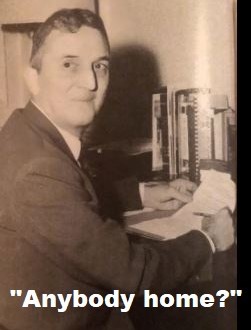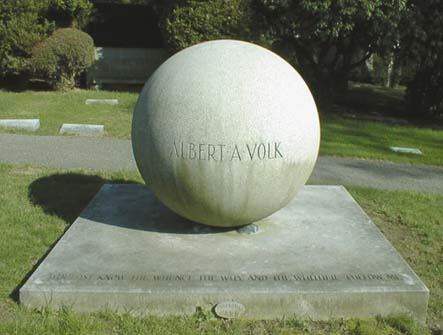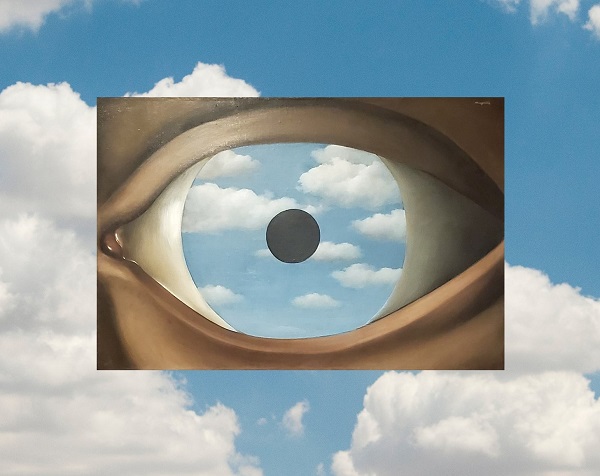Let us begin (again?)
"You are here and you are lost." (New Yorker magazine cartoon: 2 hikers looking at a big map of the trails in a state park. A big "X" marks their location)
"Everywhere journeying, inexperienced and without issue, man comes to nothing in the end." (Sophocles)
This page is going to be a meditation on beginings in a philosophical sense, attendant to my (BMcC[18-11-46-503]) rereading of Hans-Georg Gadamer's "The Beginning of Philosophy".
Where do we begin? From where we are. But where we are is a result of where we have come from, for in other situations we would not even be asking the question, etc. We begin with the pre-Socratics? But they more or less bagan in 19th Century German universities, and that was a beginning, too. But all this is conversation "in our heads" or with each other, yes? So we begin with conversation. And if we go some place else, if that does not lead to more conversatoin we lose it. What endures is where we begin: "the conversation we are". But we are that only due to certain contingent conditions which brought us to the point of thinking that.
"The gods have not, of course, revealed all things to mortals from the beginning; but rather, seeking in the course of time, they discover what is better." (Xenophanes, c. 570-478 BCE)
Even if our our life is "The Truman Show", it is real, it's just that it may not be real in the way we think it is. But building on experience by incremental correction from experience will lead to better even though never certain understanding of things. And suffering is suffered and joy is enjoyed, whatever their metaphisical status. And we are all immortal in a useless sense, because "everything" is always included in the horizon of the presentifying moment of personal experiencing where we always are. Wherever you go, you are always there and also on your way to some place else.
The first thing I have learned from "The Beginning of Philosophy" is that the fragments of the Pre-socratics – the Kirk and Raven stuff – is essentially useless because the fragments are out of context and consequently can mean one thing or something very different depending on what the context of their originally being thought and written was. So much for all that.
If I was teaching a philosophy course with Plato, I would read whatever dialogue(s) were to be studied in the course. But I would proceed in a very diffferent way from the boring, aimless seminar sessions I forget from my freshman year at Yale where the then teacher, Josiah Thompson, has today become sufficiently important that he did not respond to my email to him.
The medium is the message. I would not teach the content of the dialogue(s) → at least until after the students and myself had very carefully studied how our experiences in the classroom – our immediately living present / presence – did or did not match up to the social interactions Plato was describling [←interesting typo] among the characters in the dialogue(s), how the two were similar and how they were different, how these things were desirable or not desirable, and what we should do about our present living situation in the classroom. Here and now, not anywhere else. If there are 12 students sitting around a table and me as teach, it seems obvious to me that we are not having the same interpersonal interactions as in the dialogue(s) – there are too damned many of us. I think we should begin at the beginning. What is to be done? [If we did get to looking at a dialogue's contents, we would in studying that content keep examining it in relation to our ongoing social relations in studying it in the class.]
Finished "The Beginning of Philosophy". Didn't get too much out of it, but then, as often, I would get more out of a book if I could read it in the Rabelaisian way: in the good company of a few good friends. Gadamer greatly respects Martin Heidegger's thinking. I must presume he knew the ethical issues with the man? But the ideas are not the man. And what I read of Heidegger generally made sense, unlike the postmodernist's seeming willfully pererse obscurantism. The Ionian philosophers were concerned that beings have their place in a horizon of Being. And I had forgotten that Parmenides said (more or less:) that most people are two-headed, thinking what is is-not and what is-not is at the same time. And Parmenides is not the enemy of Heraclitus – indeed they may not have known of each other.
As an aside, with I originally bought this book a couple decades ago, one of my cats tried to digest it. I have her teeth marks on the cover.
So I think the beginning of philosophy, for us, today, remains "the conversation we are" which I have read was John Wild's one liner summary of philosophy. This certainly was not what I learned, or, a fortiori, what we students practiced, about philosophy in college; but, on the other hand, at least I was not subjected to what seems to me the sterile stultifying nit-picking 20th Century Anglo-British philosophy.
+2021.08.13. I am now going back to go forward, to try to read Professor Ronald Bruzina's (1936-2019) 600 page book: "Edmuud Husserl & Eugen Fink: Beginnings and ends in phenomenology 1928-1938 (Yale University Press, 2004). I had started to read it before what I am now calling: "The Catastrophe", where I lost most of my mine between losing a home in exchange for a house with a few more square feet and everything worse, and the job that was worse than wasted time. I had gone maybe more then 1/2 thru the book in 2004 but I no longer recall if I was getting anything out of it. I look upon it as a step hill, which begins with a longish gentle starting slope. I'm inching up that starting ramp now. I will see how far I an get to. Husserl and Fink's "Sixth Cartesian Meditation" I had also read back then and still have available. Will circumstances defeat me again? Will my ability to understand what I very much do want to understand prove not up to the task? Incipio.
Do I take as obvious what is not obvious?
Do I take as obvious something that is not obvious to "people" (you, my reader?), that, as one very tragic person I knew said:
Be a witness to your life.
I think I am always thinking that I was thinking [whatever] a second ago, and asking myself what do I think about it. Infinite regress? Thank God for ellipses ("...").
Sometime one sunny morning during the boring hot days of my probably 3rd Grade summer vacation when I was stuck in our boring 3 badroom "ranch" house on a treeless (crew cut?) yard, there was a row of trees along the side street and I was walking along this row of trees and I had some kind of self-reflective thought maybe about being going to die some day – I'm no longer sure what the first-order content of the thought was... End of story. But suppose, just suppose that I had had parents to whom I could have taken this little, unimportant, dead-end, nobody gave a shit thought and my parents would have nurtured it like a seed for a flower they wanted to raise in potting soil? Better: They would have seen me out there and gently come to encourage me. With the material for character construction with which you, my reader, have been provided, you can figure out the rest of this story for yourself.
So the beginning of philosophy is the reduction of immersive whatever-it-is to reflection on whatever-it-was as an object of study and judgment. Instead of believing in God, you reflect that a person has believed in God and you study that and decide what to do with said object of study, and then you reflect on that act of study and judgment.... Question: Did my parents and perp school masters ever think anything like the immediately preceding sentence's content?

If not such a self-reflective backhain, what does go on in people's heads?
No form of inner life is understandable which is not a process of self-understanding, true?
(Picture at right is the Headmaster of the preparatory school I attended 7th thru 12th grades, September 1958 thru May 1964.) The question here is not exacly the same as wondering what goes on in my cat's inner life. The cat does not have discursive language but seems to be alert to its surround. People seem to move along a spectrum toward and often reaching the end state of being [Mr. / Mrs. / Miss / Other...] Dialtones: You ring them up and all you get is static until the line drops. This can be a kind of perversion of The Turing Test, with a 2 legged hominid, not a computer at the other end of the connection.
To restate it once again"The meaning of the river flowing is not that all things are changing so that we cannot encounter them twice but that some things stay the same only by changing." (Heraclitus) Is does not imply ought. As soon as a thought has been thought, it has become an object in experience and therefore does not have any value. Only the living event of experiencing has value or better: is valuing which is already losing its value. Life has no meaning? Then how come you are thinking "Life has no meaning" → that must mean enough to you to make the effort to execute the act of thinking it. There is no way out, because to leave is to invest the act of leaving with valuing instead of not doing it. Value exists only in passing into mere fact which has no value but people try to think it does [have value] because they are not thinking clearly about what they are doing: they are men looking for their eyeglasses when they are on their nose, and proudly proclaminig that they are fooling themselves by saying they are not.
All aboard the USS Narrenschiff! But we can try to be wide awake and stick to what I think we have evidence for: (1) I [that means: you, my reader] am engaging in the discourse in which I am engaging and the words in said discoursing are currently meaning what I think they mean [well enough to be servicable for the job...], and (2) I can [and should] critically engage in judging and elaborating #1 as part of #1, so that it does not degenerate to no longer being #1, but instead GKW (God Knows What), or cease to exist. ⇒ Avanti! ⇒ |
 Welcome
Welcome



